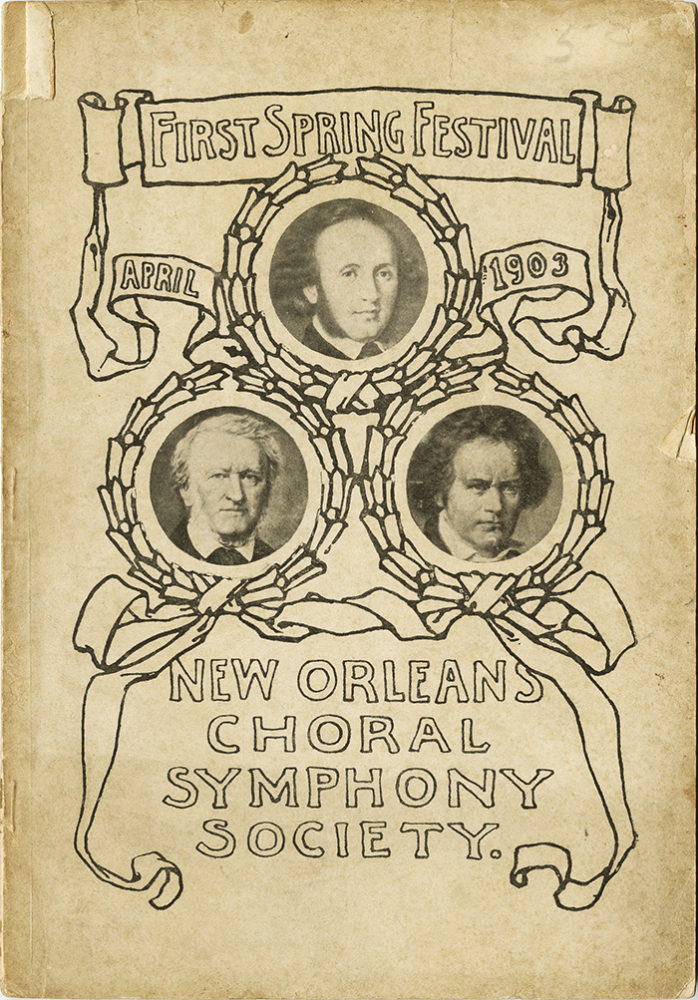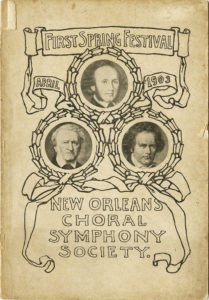Ferdinand Dunkley
Ferdinand Dunkley was an organist and composer who sought to incorporate Louisiana folklife into his compositions in works such as “Street Cries” and “Bayou Songs.”

Courtesy of The Historic New Orleans Collection
First Spring Musical Festival Programme. Unidentified
Ferdinand Dunkley was an organist and composer who sought to incorporate Louisiana folklife into his compositions in works such as “Street Cries” and “Bayou Songs.” A founder and fellow of the American Guild of Organists, he was closely associated with the New Orleans Choral-Symphony Society and the Loyola University College of Music, where he began teaching as a professor of organ and composition in 1934.
Born in London on July 26, 1869, and educated at the Battersea Grammar School, Dunkley studied composition, organ, and piano at the Royal College of Music. He was named a Fellow of the Royal College or Organists in 1886 at the age of sixteen. Dunkley moved to the United States in 1893 with his wife, a songwriter, and acquired citizenship in 1938. Initially, he was active on the East Coast and was named musical director of St. Agnes School in Albany, New York, from 1899 to 1929. In 1898, at the Music Teachers National Convention, he delivered a major address on “Practical Harmony.” Several of his compositions were performed at the same meeting. He served as organist of Christ Church Cathedral of the Diocese of New Westminster in Vancouver, British Columbia, and St. Mark’s Church, the First Methodist Church, and the First Church of Christ, Scientist, in Seattle, Washington. During his time in New Orleans, he was organist of First Unitarian Church and Touro Synagogue.
Active in a number of organizations, Dunkley was a member of the American Society of Composers, Authors, and Publishers; the National Catholic Music Educators Association; and the National Writers Club. He was also active with the Edward MacDowell Association, the New Orleans Teachers Association, and the journal Caecilia. He authored numerous published and unpublished works, and among his personal papers are typescript copies of “Bouyance of Voice in Choir Singing,” “Possible Improvement in Choir Singing through Buoyancy of Voice,” and “What Has Made Our Modern Music;” two volumes of his own organ compositions; and a manuscript instruction book on organ technique.
As a composer, he set poems to music, including by Henry Wadsworth Longfellow’s “The Wreck of the Hesperus,” first performed at the Crystal Palace in London in 1893; James Powell Lowell’s “On Moonlight Days”; and Mary Eddy Baker’s “Christ My Refugee.” His “Among Yon Mountain Fastnesses,” a suite for orchestra, was awarded a cash prize in 1889 in London. His choral compositions include the “Elected Knight” for male chorus. As a liturgical composer, he arranged and orchestrated the hymn “Praise the Lord, and Sing Unto the Lord a New Song” (for cantor and organ), and “Sabbath Eve Services for Jewish Worship.” His “Rustic Suite for Orchestra: Cradle Song” enjoyed immense popularity.
Dunkley died in Waldwick, New Jersey, on January 6, 1956, and was buried in New Orleans in Greenwood Cemetery.
